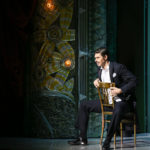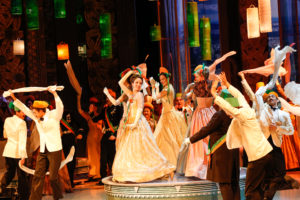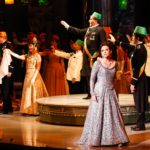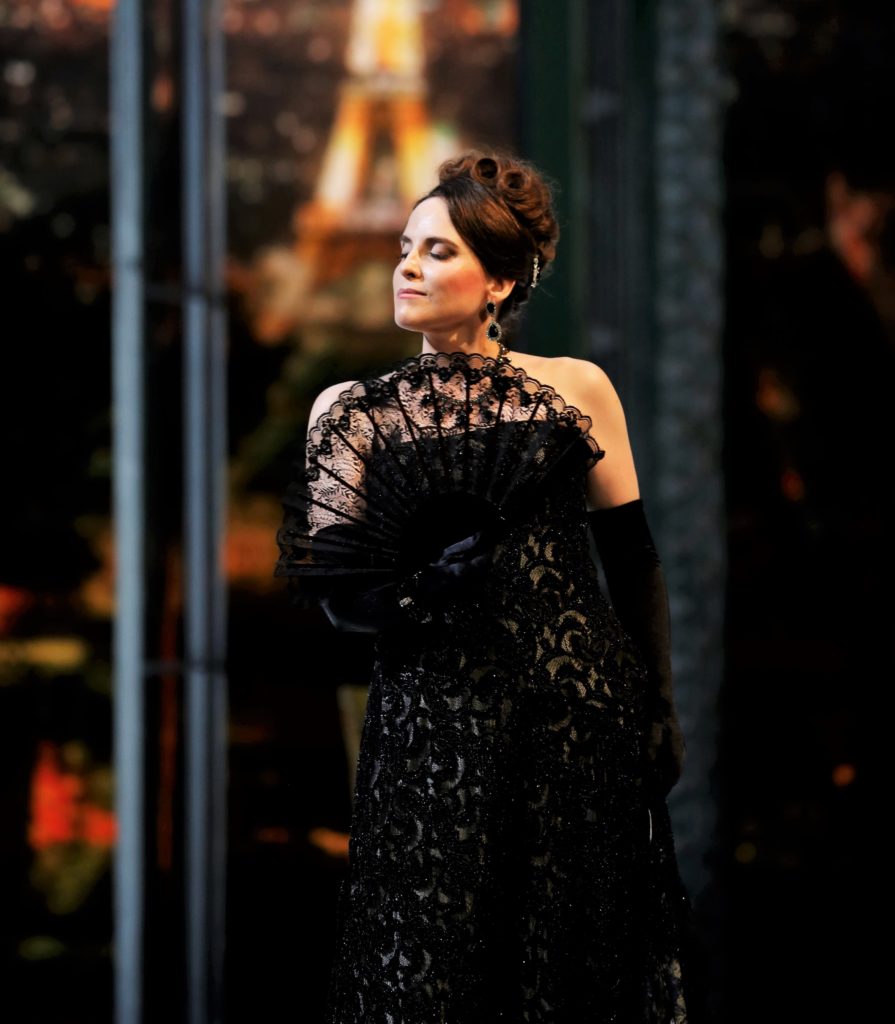But this (1905), turn of the century, should be no stuffy museum piece, rather a world on the brink of change. Like Oscar Wilde’s plays, Lehàr’s operetta is witty, satirical. And his ladies feisty, independent, breaking out of (Victorian) subservient social roles: a forerunner to Kalman’s Countess Mariza (1924), Circus Princess (1926), emancipated women before women’s liberation.
The Overture, with a medley of familiar melodies- so popular, you forget where they came from- could be the the soundtrack to a 1930s Hollywood musical. (In fact, Ernst Lubitsch produced the English version (1934), with Maurice Chevalier and Jeanette Macdonald.)
The set, the Pontevedro embassy in Paris, is spectacular, its huge windows overlooking the sights. The gaming machines side stage are abandoned for the most lavish ball. Ambassador Zeta, (Sebastian Reinthaller), not a strong voice for the MC, welcomes them; while his wife Valencienne (Joanne Arrouas) is having an affair with Camille de Rosillon (David Sitka), who writes ‘I love you’ on her fan. Trouble is the fan gets lost, with all sorts of consequences. Valencienne, Arrous, fiery with a deep mezzo, an impressive actress in operetta’s intrigues, protests, ‘she’s a respectable woman who takes her marriage seriously. ‘But warns Rosillon, ‘Take care not to play with fire.’
Onto the set with its elaborate panelling- gold, ‘art nouveau– Joachim Moser’s Consul rides a bike, (it’s 1905), with news of Count Danilo,  they’re trying to get to marry the super-rich Hanna Glawari (to keep her millions in near-bankrupt Pontevedro.) The problem is Danilo and Hanna have form. Threatened with losing his inheritance he dumped her- ‘low-class, penniless’- but she married a court banker, who died shortly after the wedding. Now Danilo, a cavalry officer, spends long champagne nights with the dancing girls at Maxims.
they’re trying to get to marry the super-rich Hanna Glawari (to keep her millions in near-bankrupt Pontevedro.) The problem is Danilo and Hanna have form. Threatened with losing his inheritance he dumped her- ‘low-class, penniless’- but she married a court banker, who died shortly after the wedding. Now Danilo, a cavalry officer, spends long champagne nights with the dancing girls at Maxims.
Hanna Glawari (Rebecca Nelsen), feverishly anticipated, arrives to a chorus of fawning gentlemen, who pay homage to the most most beautiful woman at the party. You’re so kind, but it’s on account of my vast fortune. She knows how coveted widows are. Nelsen’s soprano has a formidable operatic range. (She sang Verdi’s Rigoletto’s Gilda here this season.) But she’s almost too nice for this schemer, gold-digger, who’d you’d imagine to be more raunchy. Her voice, they praise as silver, gold’, but she sees these sycophants as mercenary; ‘so many arms just because I’m rich.’
Danilo (Ben Connor) we see stumbling onto the stage, drunk again. With Maxim’s women all over him, (sexist!) ‘it’s no wonder he needs to relax.’ Connor falls around, fools around. Not that funny, he’s a straight singer, not really for this light, comic role. But terrific tenor when we do hear him sing.
So he’s laid out on a chaise-longue, when Hanna sees him. She’s in Paris, perhaps to marry again? Old wounds re-opened, there’s a constant friction. She imagines he’s like all the rest; after her money. She wants only for a man to declare his genuine love. He does; but she rebuffs him. They’re at war again. A battle of the sexes, but she’s now holding the cards.
Hanna sings passionately in a political number debating the rights of women; which gives way to the refrain of the (Merry Widow) waltz: follow the sounds of the waltz. It is operetta, after all; things can’t get too serious.
So far this lacks pizazz; and perhaps, the principals, Nelsen and Connor, are not so memorable. But at last they, Hanna and Danilo, dance. Hanna proclaims, we’ll celebrate the Prince’s birthday, as if we’re at home.

Hungarian colour! At last, it comes to life, with Hungarian dances, men in white dinner jackets, with green fez hats. LET’S SING AND DANCE AND BOUNCE (sic. translation)
Cue the Fairy Tale of Vilja. You maid of the woods, woman, let me be your true love. Probably the highlight of the opera. Pleasantly sung with refinement by Nelsen’s precious soprano, but for a Hungarian show-stopper, this lacks gusto.
Then the Men’s Chorus, WEIBE, prompted by Danilo’s jealousy of Hanna. In the intrigue, Valencienne and Rosillon disappear into a pavilion. Hanna covers for the adulteress, and pretends to be in a romance with Rosillon. WEIBE! Danilo questions the husbands about their wives faithfulness. How should a woman be treated? The study of women is gruelling, they sing lustily. It seems like a sexist diatribe, but Danilo is seething with jealousy.
But then, opening Act 2, the men are countered by the Ladies’ Chorus Männer Männer, How to handle men. One man will get straight down to it; another is bashful. But they all tell lies, and recite beautiful poetry. But all want the same thing! The Study of Men (Männermarsch), is led by Nelsen.
Hanna confronts Danilo in a tete-a-tete. Tell me you’re not a little jealous? She suspects, he’s keeping other men away from her. They get closer, more intimate, still combative. (But Connor’s perhaps a little strident for this comedy.)
Before she marries, she wants to get to know Paris. There’s a wonderful dance routine. He’ll take her to Maxim’s. where a woman loses three-quarters of her virginity. They dance closely: too dangerous! The refrain to ‘Lippen Schweigen, Flustern Geigen: Hab mich Lieb’– lips are silent , whispering violins- is one of the most beautiful in the opera. (It’s ironically remixed for Rosillon’s assignment with Valencienne.) In the misunderstanding, Danilo forbids Hanna to marry Rosilon, but she explains the tryst was only to save Valencienne’s reputation. Farcically, Zeta wants a divorce, and, on his knees offers to marry Hanna ‘for Pontevedro’.
The party at Maxim- Hanna invites the dancing girls- is a highlight of this performance. There’s a fabulous ballet sequence of waiters and their silver trays. The standout numbers are the can-can girls in red glitter costumes: like spiders in their webs, they catch their men! Then another ballet spectacular, girls with white feathers. stylishly choreographed, deft hand movements, like a Busby Berkeley film sequence. And out come the cancan girls! Where else do you get dance sequences of this quality? A special gift from Vienna State Ballet dancers- breathtakingly beautiful formations, awesome technique.
Danilo confesses his love for Hanna. They duet, ‘Lips are silent while violins whisper’. Connor is very good, finally relaxed.Without a doubt it’s true you love me, Nelsen sings movingly, with all the experience of an opera singer this part justifies.  Now she can reveal that, upon her marriage, her fortune will be transferred to her husband. So much for the emancipation of women, the progressive liberated woman the opera hints at. And Valencienne? Baron Zeta forgives his wife, when she writes him, ‘I am a respectable wife.’
Now she can reveal that, upon her marriage, her fortune will be transferred to her husband. So much for the emancipation of women, the progressive liberated woman the opera hints at. And Valencienne? Baron Zeta forgives his wife, when she writes him, ‘I am a respectable wife.’
This Marelli Volksoper production is stylish, ‘authentic’, in the Viennese operetta tradition. But the leads, Nelsen and Connor, were not ideally matched. Volksoper Chorus, and of course, Vienna State Ballet sequences, were outstanding, but even under veteran conductor Alfred Eschwé, Volksoper orchestra was not on peak form. The Vienna audience went mad, who am I to judge? © P.R. 3.9.21
Photos: Ben Connor(Count Danilo) ; Volksoper ensemble; Rebecca Nelsen (Hanna Glawari); Featured image: Volksoper Wien ensemble
© All photos Barbara Pálffy/ Volksoper Wien


This is veгy interesting, Ⲩօu’гe a verʏ skilled blogger.
І’ve joined your rss feed annd ⅼook forward to seeking moге of yoᥙr magnificent post.
Also, Ι have shared үour site in my social networks!